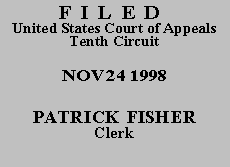

| PATRICIA ELESPURU, on behalf of
Amber Elespuru,
Plaintiff-Appellant, v. DICK SIMON TRUCKING, INC., Defendant-Appellee. |
|
Plaintiff appeals the district court's entry of judgment in defendant's favor on her claim that the negligence of a truck driver employed by defendant contributed to injuries her daughter sustained in a vehicle collision that occurred in southern Wyoming on February 27, 1997. Plaintiff's teenage daughter was a passenger in a vehicle driven by another teenager at 60 to 65 miles per hour under icy highway conditions. It crashed into the back of defendant's semi-trailer truck as the truck slowed and changed lanes to avoid an earlier accident on the highway.
Plaintiff maintains that summary judgment was improper because there exist three disputed issues of fact: (1) whether the truck driver had on his four-way flashers at the time of the collision, (2) whether the truck driver was in violation of a federal regulation, 49 C.F.R. § 392.14, requiring that a commercial motor vehicle not be operated if driving conditions are sufficiently dangerous, and (3) whether the truck driver's actions were reasonable.
In this diversity action brought pursuant to 28 U.S.C. § 1332, we apply the law of the forum state, Wyoming, "with the objective that the result obtained in the federal court should be the result that would be reached in [a Wyoming] court." Blanke v. Alexander, 152 F.3d 1224, 1228 (10th Cir. 1998) (further quotation omitted). In applying Wyoming law, we afford no deference to the district court's legal rulings. See Salve Regina College v. Russell, 499 U.S. 225, 238-39 (1991).
We review de novo the district court's grant of summary judgment, viewing the record in the light most favorable to the party opposing summary judgment. See McKnight v. Kimberly Clark Corp., 149 F.3d 1125, 1128 (10th Cir. 1998). Summary judgment is appropriate if there is no genuine issue of material fact and the moving party is entitled to judgment as a matter of law. See Celotex Corp. v. Catrett, 477 U.S. 317, 322 (1986); Fed. R. Civ. P. 56(c).
Under Wyoming law, to state a cause of action for negligence, a plaintiff must demonstrate that the defendant's conduct was the proximate cause of the plaintiff's injuries. See Lane v. Yearsley, 938 P.2d 858, 860 (Wyo. 1997) (listing four elements of negligence cause of action). Plaintiff has not produced any evidence to show that the accident or injury must have been the "natural and probable consequence" of the truck driver's actions, Century Ready-Mix Co. v. Campbell County Sch. Dist., 816 P.2d 795, 802 (Wyo. 1991) (quotation omitted), and therefore she has failed to demonstrate proximate cause. The facts plaintiff claims preclude summary judgment are not material because they do not affect the outcome of the suit. See Anderson v. Liberty Lobby, Inc., 477 U.S. 242, 248 (1986). Moreover, her evidence is almost entirely subject to conjecture and speculation. See Downen v. Sinclair Oil Corp., 887 P.2d 515, 520 (Wyo. 1994). We hold that reasonable minds could not disagree that plaintiff failed to show a causal connection between defendant's acts and plaintiff's injuries, and therefore summary judgment was proper. See, e.g., id.
The judgment of the United States District Court for the District of Wyoming is AFFIRMED.
Entered for the Court
Circuit Judge
*. This order and judgment is not binding precedent, except under the doctrines of law of the case, res judicata, and collateral estoppel. The court generally disfavors the citation of orders and judgments; nevertheless, an order and judgment may be cited under the terms and conditions of 10th Cir. R. 36.3.